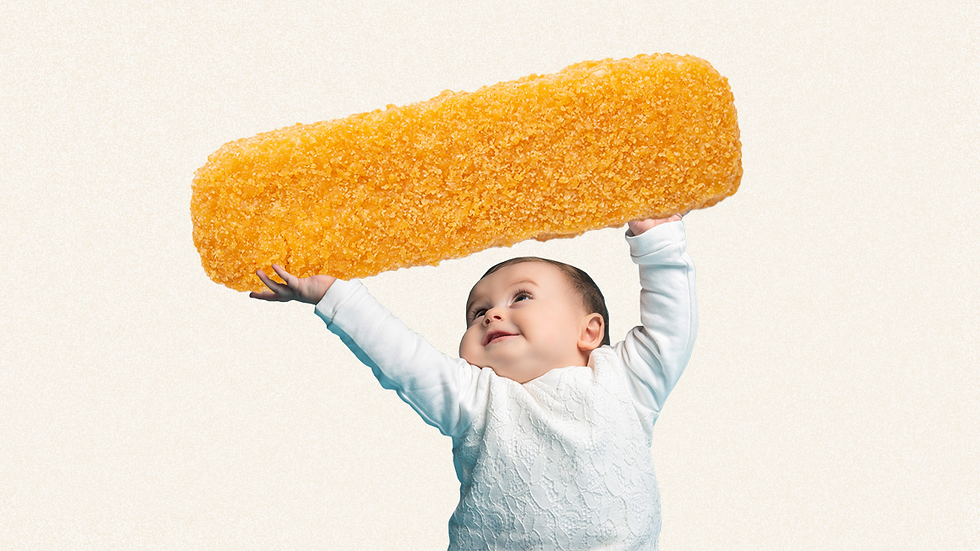Why are Nutrition and Hydration so Important for Us?
- Flick Learning

- Nov 25, 2025
- 3 min read

Food and drink provide the energy and nutrients we all need to be healthy.
Good nutrition and proper hydration are the foundations of wellbeing. They affect everything from physical growth, cognitive development, and emotional regulation to immunity, energy levels, and long-term health.
This is important for everyone, no matter who you are and how old you are, but it’s especially important for those who depend on others to meet their daily needs – such as young children and people in care settings, for whom maintaining a healthy diet and adequate fluid intake is not just beneficial but essential.
In this post we'll cover:
Why Nutrition and Fluids Matter in Early Years
The early years of life are a period of rapid growth.
Between birth and age five, children undergo huge developmental changes, and what they eat directly shapes that journey. A balanced diet provides the building blocks needed for strong bones, healthy brain development, good eyesight, and a robust immune system. Poor nutrition can lead to delayed development, difficulties with concentration, frequent illness, and long-term health problems.
Hydration is equally important.
Young children are particularly vulnerable to dehydration because their bodies hold a higher proportion of water and they may not recognise or communicate thirst. Ensuring they have regular access to healthy drinks supports healthy digestion, temperature regulation, and overall energy levels.
The UK government published new guidance in this area earlier in 2025 to help the provision of healthy, balanced and nutritious food in their settings, which helps to lay the groundwork for healthy choices in adulthood. Find out more about the New Requirements for Safe Eating in Early Years in our blog post.

The Importance of Nutrition and Hydration for People in Care
Although the principles of balanced nutrition and good hydration are the same for everyone, for those in care it can become more complex.
Factors such as reduced appetite, difficulty swallowing, memory loss, medication side effects, or limited mobility can all increase the risk of malnutrition and dehydration.
In care settings, staff play a crucial role in checking intake and ensuring meals are not only nutritious but appealing and accessible. Proper nutrition helps maintain muscle strength, supports wound healing, boosts immunity, and improves overall quality of life.
Hydration, likewise, reduces the risk of urinary tract infections, constipation, confusion, and falls – issues that can quickly escalate into medical emergencies.
Creating Supportive Environments
Promoting good nutrition and hydration in both early years and in care is about more than simply providing food and drink.
It involves creating accessible, person-centred environments that include pleasant mealtime experiences, varied choices, respecting cultural preferences, encouraging independence where possible, and observation for things like changes in eating or drinking habits.
Ultimately, nutrition and hydration are not just daily tasks – they are vital components of dignity, health, and wellbeing. By giving focused support to the youngest members of society and those receiving care, we help ensure that everyone can thrive.

Training Your Staff in Nutrition and Hydration
To that end, flick are currently working on two brand new courses – Nutrition and Fluids in Early Years, and Nutrition and Fluids in Care.
Each of these courses cover everything that your staff need to know about the importance of proper nutrition and hydration in those settings, so you can be confident that their training is sufficient to support those they are looking after.
We also have a range of other courses suitable for both the childcare and education and care sectors.
For early years we have dozens of relevant training courses that cover everything from safeguarding to data protection, as well as neurodiversity and paediatric first aid.
The courses we have for the care sector include:
Trauma-Informed Practice
Mental Capacity
Adult Safeguarding Levels 1, 2 and 3
Handling Medication in Care

What Else do flick Offer?
flick have over 150 courses within the flick library, spanning across the following six categories:
Childcare & Education
Financial Crime
Handling Information
Health & Safety
Safeguarding
Soft Skills.
You get unlimited access to all of these courses (think Netflix) when you sign up for a subscription with flick. Or, if you have your own LMS, you can license as many flick courses as you would like to host on your platform.
Stay up to date with all things flick, including news about our new courses, updates to legislation and brand-new features, by signing up to receive our monthly newsletter and following us on LinkedIn, Facebook, and Instagram.
.png)




Comments